The debut of ChatGPT has led some tech experts to declare it part of a “robot revolution.” But most Americans haven’t used ChatGPT, and only a small share think chatbots will have a major impact on their jobs. Even fewer Americans say chatbots would be helpful for their own work, according to a new Pew Research Center survey conducted July 17-23.
Pew Research Center has long explored Americans’ perspectives on emerging technologies and uses of artificial intelligence. The current study examined adults’ experiences with chatbots such as ChatGPT, particularly in relation to their jobs. This survey was conducted among 5,057 U.S. adults from July 17 to 23, 2023. Everyone who took part in the survey is a member of the Center’s American Trends Panel (ATP), an online survey panel that is recruited through national, random sampling of residential addresses. This way nearly all U.S. adults have a chance of selection. The survey is weighted to be representative of the U.S. adult population by gender, race and ethnicity, partisan affiliation, education and other categories. Read more about the ATP’s methodology.
Here are the questions used for this analysis, along with responses, and its methodology.
Who has used ChatGPT?
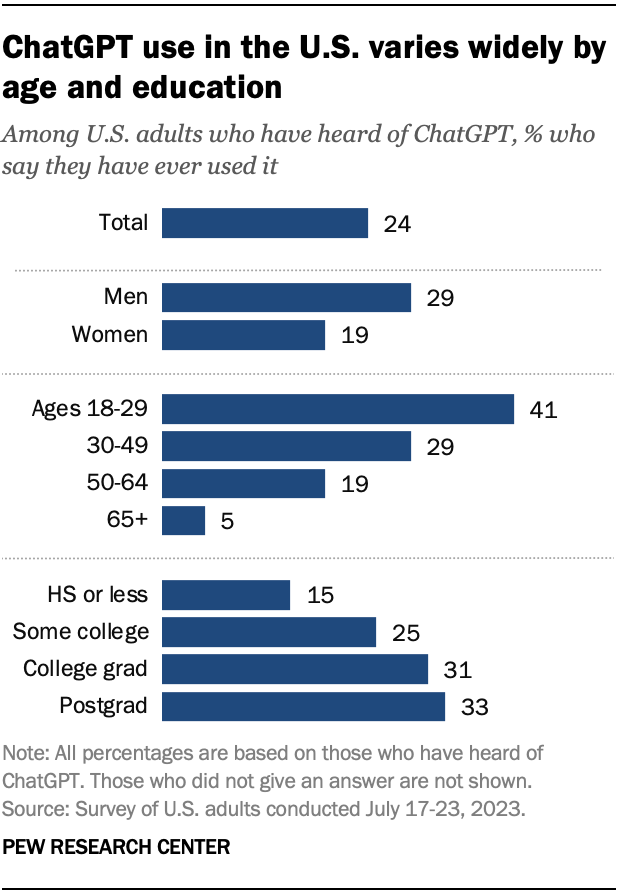
Roughly a quarter of Americans who have heard of ChatGPT (24%) say they have ever used it. That amounts to 18% of U.S. adults overall.
- Younger adults are more likely than older adults to have used ChatGPT. Among those who have heard about ChatGPT, about four-in-ten adults under 30 have used it; that share drops to 19% when looking at 50- to 64-year-olds and to just 5% for those 65 and older.
- College-educated Americans stand out: 32% of adults who have a college degree or more education and have heard of ChatGPT have used it.
- Among those who have heard of the chatbot, men are more likely than women to report using ChatGPT (29% vs. 19%).
How do Americans use ChatGPT?
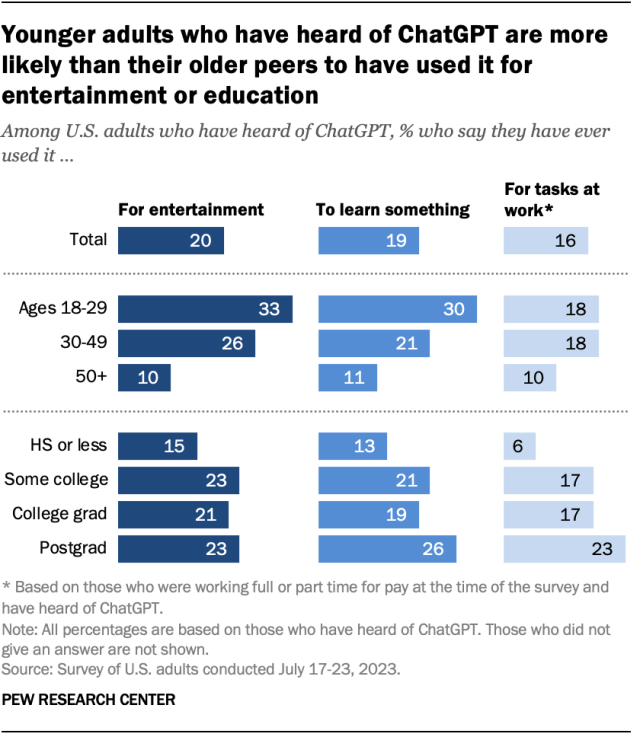
One-in-five U.S. adults who have heard of ChatGPT say they have ever used it for entertainment. A similar share (19%) say they have used it to learn something, while 16% of those who have heard of the tool and are employed say they have used it for tasks at work.
Younger adults are more likely than their older peers to have used ChatGPT for education or amusement. For example, among those who have heard of ChatGPT, three-in-ten adults under 30 have used it for learning, compared with 11% of those 50 and older.
Similarly, 29% of adults who are under 50 and have heard of ChatGPT have used it for entertainment, while 10% of their older counterparts have done the same.
There is a similar pattern among employed adults who have heard of the tool: Those under 50 are more likely than those 50 and older to report having used ChatGPT for work (18% vs. 10%).
Adults with a high school education or less who have heard of ChatGPT are significantly less likely than their peers with higher levels of formal education to have used ChatGPT for entertainment, learning or work. For example, among those who have heard of ChatGPT, 13% who have a high school diploma or less say they have used it to learn something new, compared with roughly one-in-five or more of those with some college (21%), a bachelor’s degree (19%) or a postgraduate education (26%).
How has ChatGPT use changed recently?
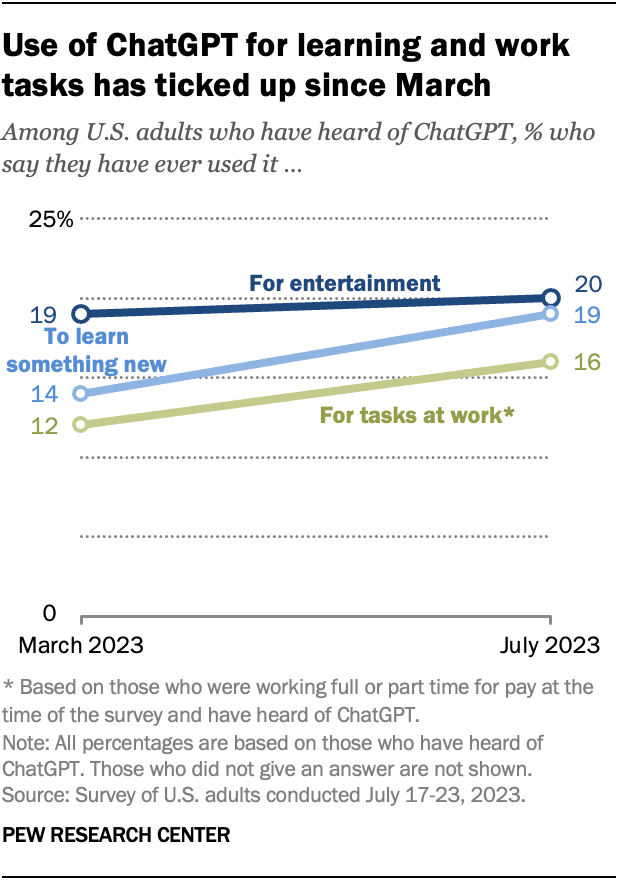
More Americans who have heard of ChatGPT are using it for work and learning today than when the Center first asked about this in the spring. For example, the share of employed adults who have heard of ChatGPT and have used it for work tasks increased from 12% in March to 16% in the new survey, which was conducted in July. The share who have used ChatGPT to learn something has also risen slightly during this time.
Which industries do Americans think will be most affected by chatbots?
Generative artificial intelligence like ChatGPT may have its greatest impact on jobs that were traditionally thought to be immune from automation – namely, higher-paying jobs that require a college education.
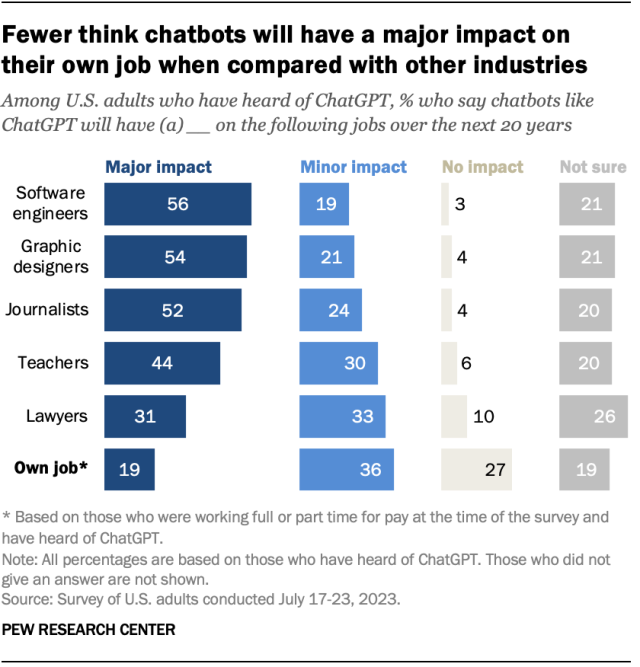
In the Center’s new survey, about half or more of those who have heard of ChatGPT say chatbots will have a major impact on software engineers (56%), graphic designers (54%) and journalists (52%) over the next 20 years. Smaller shares think chatbots will have a major effect on teachers (44%) or lawyers (31%).
But Americans are less likely to think chatbots will impact their own job. Some 19% of employed adults who have heard of ChatGPT think chatbots will have a major impact on their job. Another 36% say it will have a minor impact and 27% expect no impact at all.
Which Americans are most likely to think chatbots will affect their own jobs?
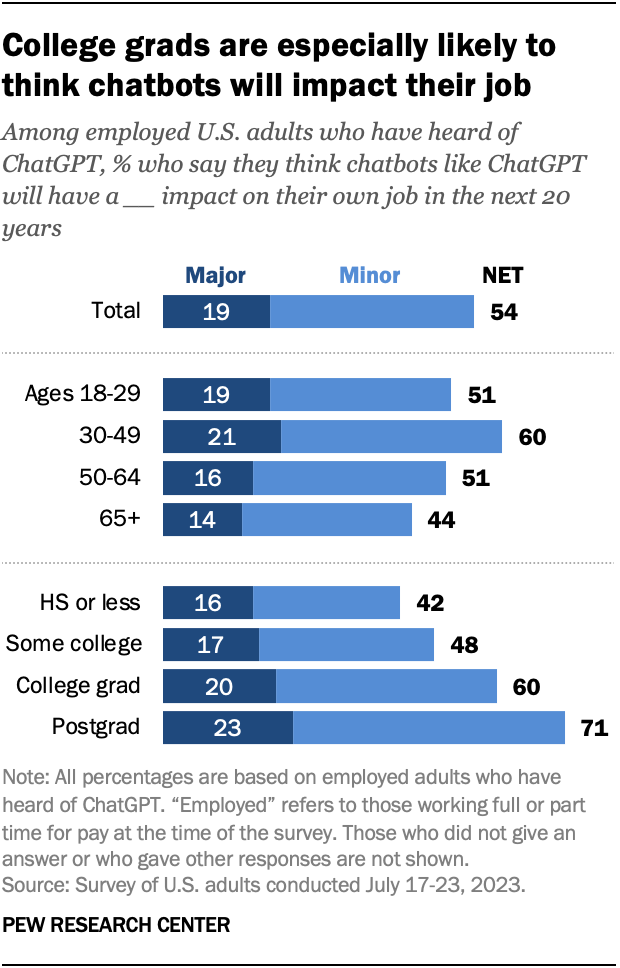
Among employed adults who have heard of ChatGPT, 60% of those ages 30 to 49 say chatbots will have a major or minor impact on their own job in the next 20 years. This is the highest percentage of any age group.
Those with more formal education are also more likely to think chatbots will have an impact on their job. For example, among working adults who have heard of ChatGPT, 71% of those who have a postgraduate degree say this, compared with 60% of those with a bachelor’s degree only and even smaller shares of those with some college (48%) or a high school diploma or less (42%).
Views on this question also vary by industry.
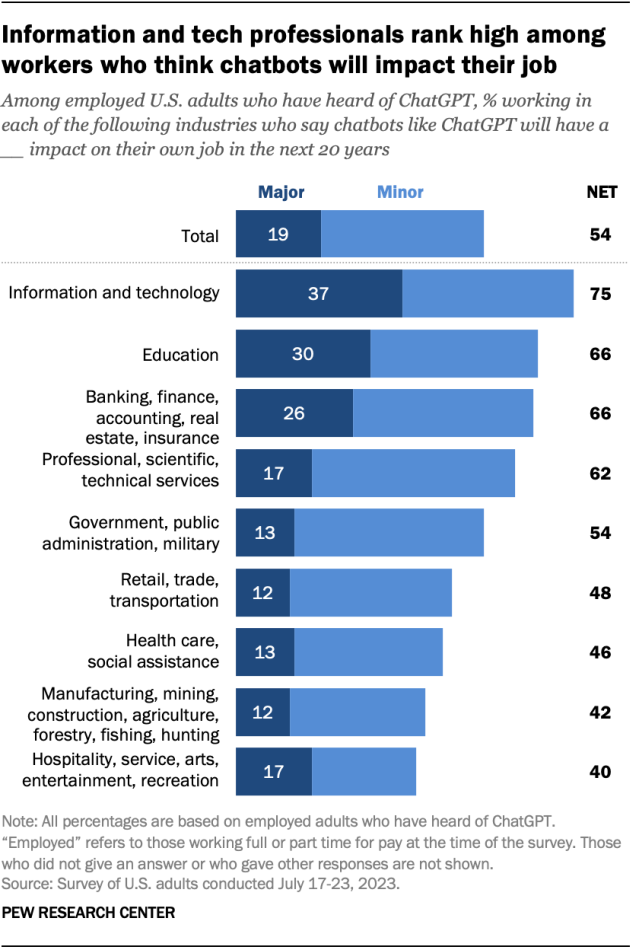
Those who work in information and technology and have heard of ChatGPT are the most likely to say chatbots will have a major or minor impact on their job. Three-quarters of these workers say this, including 37% who say chatbots will have a major impact on their work.
Around two-thirds (66%) of those who have heard of ChatGPT and work in education banking, finance, accounting, real estate or insurance think chatbots will affect their job.
At the other end of the spectrum, 40% of adults who have heard of ChatGPT and work in hospitality, service, arts, entertainment or recreation say chatbots will affect their job.
Will chatbots help people do their jobs?
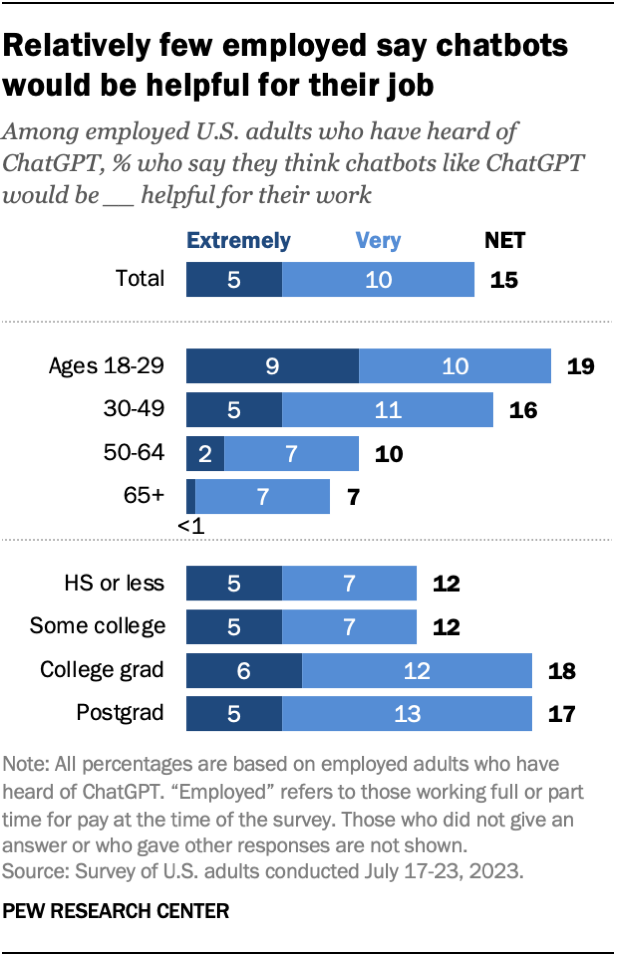
Most employed Americans don’t anticipate chatbots being very helpful for their own work. Only 15% of working adults who have heard of ChatGPT say chatbots would be extremely or very helpful for their job, with 5% saying they would be extremely helpful.
Younger workers who have heard of ChatGPT are more optimistic that chatbots would help them do their job.
Workers with higher levels of formal education are also more optimistic. Those who have heard of ChatGPT and have a college degree are slightly more likely than those without a college degree to say these types of tools would be helpful for their job.
How do Americans feel about government regulation of chatbots?
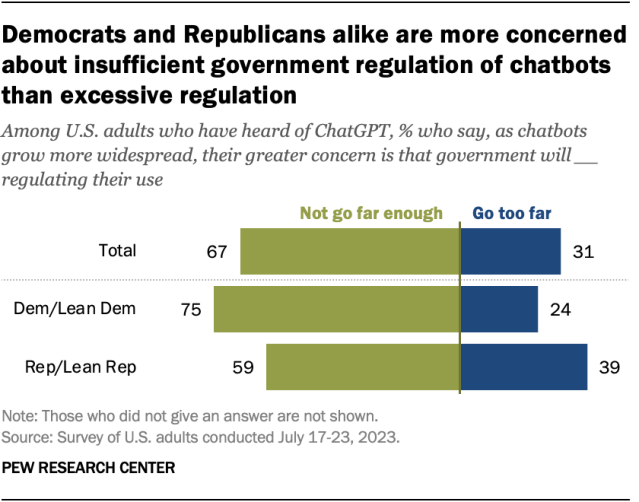
The emergence of ChatGPT has sparked conversations about government regulation of artificial intelligence.
Asked which is their greater concern, two-thirds of those who have heard of ChatGPT say it’s that government will not go far enough in regulating chatbot use. Some 31% instead say their greater concern is that the government will go too far.
Of those who have heard of ChatGPT, majorities of Democrats and Republicans say their greater concern is not enough regulation. But this view is more common among Democrats and Democratic-leaning independents than among their Republican and Republican-leaning counterparts (75% vs. 59%).
Note: Here are the questions used for this analysis, along with responses, and its methodology.

Risa Gelles-Watnick is a research analyst focusing on internet and technology research at Pew Research Center.


0 Comments